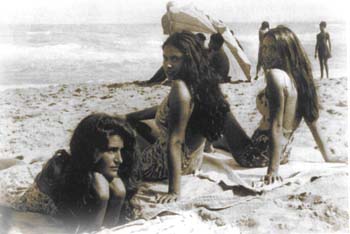![[Metroactive Movies]](/movies/gifs/movies468.gif)
![[Metroactive Movies]](/movies/gifs/movies468.gif)
[ Movies Index | Metro | Metroactive Central | Archives ]
Mideast Sights
A feminist undercurrent informs the selections at the Arab Film Festival
THE QUARTET of films on view during the one-day Arab Film Festival, June 28 at the Towne Theater in San Jose, provides a variety of feminist perspectives. Umm Kulthum, A Voice Like Egypt (3:20pm) is Michael Goldman's documentary on Kulthum, the immensely popular Egyptian vocalist who began in a small village and who ended as the most popular Arabic singer of her era; her 1975 funeral drew 4 million mourners. Elia Suleiman's Chronicle of a Disappearance (5pm) is not an easy film to like, except by film festival selectors (it also showed at the San Francisco International Film Festival and will turn up later this month at the Jewish Film Festival). Suleiman combines a tendency toward excruciatingly long takes with a very bitter sensibility to observe modern-day Israel in cryptic, almost unrelated sketches. The film would be unwatchable if so many of the images weren't telling: an Arab woman frustrated as she tries to rent an apartment outside of the Arab section of Jerusalem; a wheel of kitschy postcards available to the pilgrim to the Holy Land; a priest bitching about what tourists have done to the Sea of Galilee.
The Silences of the Palace (7pm) is Moufida Tlatli's account of a high-strung Tunisian singer named Alia (Ghalia Lacroix) facing two crises: first, another unmarried pregnancy and thus the possibility of yet another abortion; second, the death of Price Sid'Ali, in whose entourage she grew up. In flashback, Alia remembers her youth in Sid'Ali's palace as the daughter of the lord's cook and concubine. This is a landmark film; Tlatli was elevated to the status of the female director in the Arab world through this international success. As drama, though, it's predictable; Alia's decision is easy to figure out.
A Summer in La Goulette (9:30pm) is the latest work by Férid Boughédir, who is also from the relatively liberal country of Tunisia. Boughédir previously made the playful and very sexy Halfouine, Boy of the Terraces, which is full of authentic Orientalism. What I mean is that there's a real source for some of the popular notions of what the land of the Arabs is like, and Boughédir captured it--the moon on the terraced roofs, the liveliness of the marketplace, the languidness of the women's baths (completely different from the way it was imagined by European artists like Ingres--and yet still arousing). Here Boughedir films in the harbor town of La Goulette, outside of Tunis. Three families (one Christian, one Jewish and one Arab) who were once friends are conflicted by the Arab-Israeli war of 1967. Mutual understanding (and the deus-ex-machina appearance of La Goulette's favorite daughter, Claudia Cardinale) provides hope for reunion.
[ Metro | Metroactive Central | Archives ]

On the Beach: A scene from 'A Summer in La Goulette'
The Arab Film Festival, sponsored by the Arab Women's Solidarity Association, takes place Sunday (June 28) at the Towne Theater in San Jose. Tickets are $7/$5. Call 415/863-1087 for details.
From the June 26-July 2, 1997 issue of Metro.